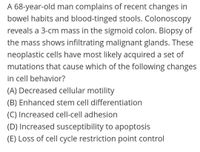
Phlebotomy Essentials
6th Edition
ISBN: 9781451194524
Author: Ruth McCall, Cathee M. Tankersley MT(ASCP)
Publisher: JONES+BARTLETT PUBLISHERS, INC.
expand_more
expand_more
format_list_bulleted
Question
A 68-year-old man complains of recent changes in bowel habits and blood-tinged stools. Colonoscopy reveals a 3-cm mass in the sigmoid colon. Biopsy of the mass shows infiltrating malignant glands. These neoplastic cells have most likely acquired a set of mutations that cause which of the following changes in cell behavior? (A) Decreased cellular motility (B) Enhanced stem cell differentiation (C) Increased cell-cell adhesion (D) Increased susceptibility to apoptosis (E) Loss of cell cycle restriction point control

Transcribed Image Text:A 68-year-old man complains of recent changes in
bowel habits and blood-tinged stools. Colonoscopy
reveals a 3-cm mass in the sigmoid colon. Biopsy of
the mass shows infiltrating malignant glands. These
neoplastic cells have most likely acquired a set of
mutations that cause which of the following changes
in cell behavior?
(A) Decreased cellular motility
(B) Enhanced stem cell differentiation
(C) Increased cell-cell adhesion
(D) Increased susceptibility to apoptosis
(E) Loss of cell cycle restriction point control
Expert Solution
This question has been solved!
Explore an expertly crafted, step-by-step solution for a thorough understanding of key concepts.
This is a popular solution
Trending nowThis is a popular solution!
Step by stepSolved in 2 steps

Knowledge Booster
Learn more about
Need a deep-dive on the concept behind this application? Look no further. Learn more about this topic, nursing and related others by exploring similar questions and additional content below.Similar questions
- A 40 year old woman goes to see a physician to get a painful lump in her breast checked out. She tells the doctor that the lump persists for the full menstrual cycle, and a mammogram identified this lump only within the breast. 1) What is the best approach to identify if this lump is breast cancer or if it is benign? 2) They caught it early and the lump has been identified it as stage 1 breast cancer, classified as triple negative. What are two treatment approaches specific for this stage and classification of breast cancer? 3) The woman has 2 teenage daughters. a) What could you assess to determine if the daughters are at a genetic risk for breast cancer? b) What are 4 strategies that the daughters could modify in their daily life that would help in prevention and reducing their risk of developing breast cancer?arrow_forwardplease answer a,b and carrow_forwardsid c'T. How does the structure of columnar cells in mucosa of small intestine promote digestion? a) it helps in propelling mucus from apical surface of cells b) it helps in transporting oxygen c) it helps in communication between cells d) it helps in increasing surface areaarrow_forward
- Hepatocytes: A) Store fat-soluble vitamins B) All these answers are correct C) Perform detoxification D) process bloodborne nutrients E) Produce -900 ml bile per dayarrow_forwardA 55-year-old female patient who is positive for MR SA is having laparoscopic cholecystectomy. During the procedure, the surgeon encounters unexpected bleeding from the liver bed and decides to convert to an open cholecystectomy. Which category of medications will be used during the "Intraoperative cholangiography" segment of the procedure? Name three medications from this category.arrow_forwardWhich type of medication administration route bypasses the gastrointestinal tract? a) Oral b) Subcutaneous c) Intravenous d) Intramusculararrow_forward
arrow_back_ios
arrow_forward_ios
Recommended textbooks for you
 Phlebotomy EssentialsNursingISBN:9781451194524Author:Ruth McCall, Cathee M. Tankersley MT(ASCP)Publisher:JONES+BARTLETT PUBLISHERS, INC.
Phlebotomy EssentialsNursingISBN:9781451194524Author:Ruth McCall, Cathee M. Tankersley MT(ASCP)Publisher:JONES+BARTLETT PUBLISHERS, INC. Gould's Pathophysiology for the Health Profession...NursingISBN:9780323414425Author:Robert J Hubert BSPublisher:Saunders
Gould's Pathophysiology for the Health Profession...NursingISBN:9780323414425Author:Robert J Hubert BSPublisher:Saunders Fundamentals Of NursingNursingISBN:9781496362179Author:Taylor, Carol (carol R.), LYNN, Pamela (pamela Barbara), Bartlett, Jennifer L.Publisher:Wolters Kluwer,
Fundamentals Of NursingNursingISBN:9781496362179Author:Taylor, Carol (carol R.), LYNN, Pamela (pamela Barbara), Bartlett, Jennifer L.Publisher:Wolters Kluwer, Fundamentals of Nursing, 9eNursingISBN:9780323327404Author:Patricia A. Potter RN MSN PhD FAAN, Anne Griffin Perry RN EdD FAAN, Patricia Stockert RN BSN MS PhD, Amy Hall RN BSN MS PhD CNEPublisher:Elsevier Science
Fundamentals of Nursing, 9eNursingISBN:9780323327404Author:Patricia A. Potter RN MSN PhD FAAN, Anne Griffin Perry RN EdD FAAN, Patricia Stockert RN BSN MS PhD, Amy Hall RN BSN MS PhD CNEPublisher:Elsevier Science Study Guide for Gould's Pathophysiology for the H...NursingISBN:9780323414142Author:Hubert BS, Robert J; VanMeter PhD, Karin C.Publisher:Saunders
Study Guide for Gould's Pathophysiology for the H...NursingISBN:9780323414142Author:Hubert BS, Robert J; VanMeter PhD, Karin C.Publisher:Saunders Issues and Ethics in the Helping Professions (Min...NursingISBN:9781337406291Author:Gerald Corey, Marianne Schneider Corey, Cindy CoreyPublisher:Cengage Learning
Issues and Ethics in the Helping Professions (Min...NursingISBN:9781337406291Author:Gerald Corey, Marianne Schneider Corey, Cindy CoreyPublisher:Cengage Learning

Phlebotomy Essentials
Nursing
ISBN:9781451194524
Author:Ruth McCall, Cathee M. Tankersley MT(ASCP)
Publisher:JONES+BARTLETT PUBLISHERS, INC.

Gould's Pathophysiology for the Health Profession...
Nursing
ISBN:9780323414425
Author:Robert J Hubert BS
Publisher:Saunders

Fundamentals Of Nursing
Nursing
ISBN:9781496362179
Author:Taylor, Carol (carol R.), LYNN, Pamela (pamela Barbara), Bartlett, Jennifer L.
Publisher:Wolters Kluwer,

Fundamentals of Nursing, 9e
Nursing
ISBN:9780323327404
Author:Patricia A. Potter RN MSN PhD FAAN, Anne Griffin Perry RN EdD FAAN, Patricia Stockert RN BSN MS PhD, Amy Hall RN BSN MS PhD CNE
Publisher:Elsevier Science

Study Guide for Gould's Pathophysiology for the H...
Nursing
ISBN:9780323414142
Author:Hubert BS, Robert J; VanMeter PhD, Karin C.
Publisher:Saunders

Issues and Ethics in the Helping Professions (Min...
Nursing
ISBN:9781337406291
Author:Gerald Corey, Marianne Schneider Corey, Cindy Corey
Publisher:Cengage Learning